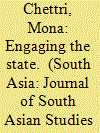| Srl | Item |
| 1 |
ID:
142829


|
|
|
|
|
| Summary/Abstract |
In the eastern Himalayan borderland, state-led initiatives have led to the transformation of pre-existing patronage networks and placed ethnic identity at the core of regional politics. Based on ethnographic research in Sikkim, the paper illustrates the prolific rise of affirmative action politics and its relationship with ethnic identity, which has altered the social, political and religious landscape of Sikkim. The paper introduces a new approach to understanding borderlands as dynamic political spaces and contributes to a nuanced understanding of emerging forms of political agency and interaction on the peripheries of regional South Asia.
|
|
|
|
|
|
|
|
|
|
|
|
|
|
|
|
| 2 |
ID:
162257


|
|
|
|
|
| Summary/Abstract |
Jordan is a country of contrasts. Few people can boast of being a hundred percent rooted within the boundaries of the actual Kingdom. Almost everyone has relatives across several borders. The aim of this article is to explore the extent to which tribalism in Jordan acts as an identity source or the extent to which it is politicized and instrumentalized to protect economic and social benefits. My literature framework is the instrumentalist theory of ethnicity and the border studies literature. The extent to which ethnicity guarantees a return to the people determines people’s adherence to it. Some scholars regard ethnicity as a tool of political mobilization because ethnic groups could be considered also as interest groups. This theory provides an explanation of tribal behavior regarding the role of identity. As an example, I describe how East Bankers have reacted to challenges from the Palestinian population since 1948. In particular, the present-day delicate equilibrium among East Bankers and Palestinians is deeply decisive in regard to the Jordanian response to the regional crisis.
|
|
|
|
|
|
|
|
|
|
|
|
|
|
|
|
| 3 |
ID:
145463


|
|
|
|
|
| Summary/Abstract |
Public discourse in India's northeastern state Meghalaya is dominated by issues of tribal identity and the threat of being overwhelmed by outsiders. In the context of national elections, local campaigners have to respond to and navigate between the different requirements of national and regional politics. Election campaigns, understood as a negotiation process during which campaigners act as brokers, provide insights into the narratives and characteristics of politics in Meghalaya. Manifestos, leaflets and large-scale events communicate a statement about organisational strength and a candidate's popularity, and subsequently about the capacity to ultimately deliver to the voter. Aesthetics used during campaigning such as music and clothing styles carry messages about the awareness and closeness of the campaigner to the imagination and needs of the local population. Although the entrance of social media into election campaigning is about to change elections and the role of campaigners in Meghalaya, local campaigners will remain important due to their ability to navigate between different levels of politics and to resolve contradictory campaign messages by drawing on different semiotic registers of campaigning.
|
|
|
|
|
|
|
|
|
|
|
|
|
|
|
|